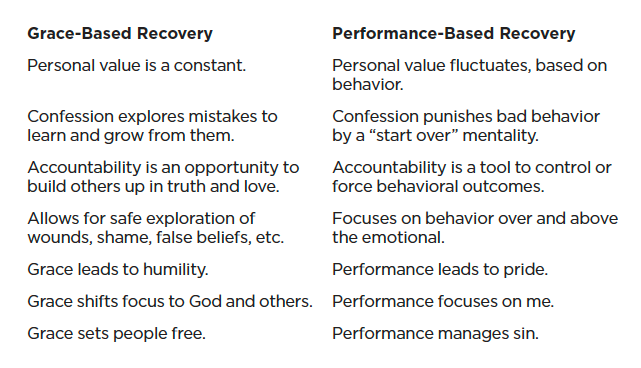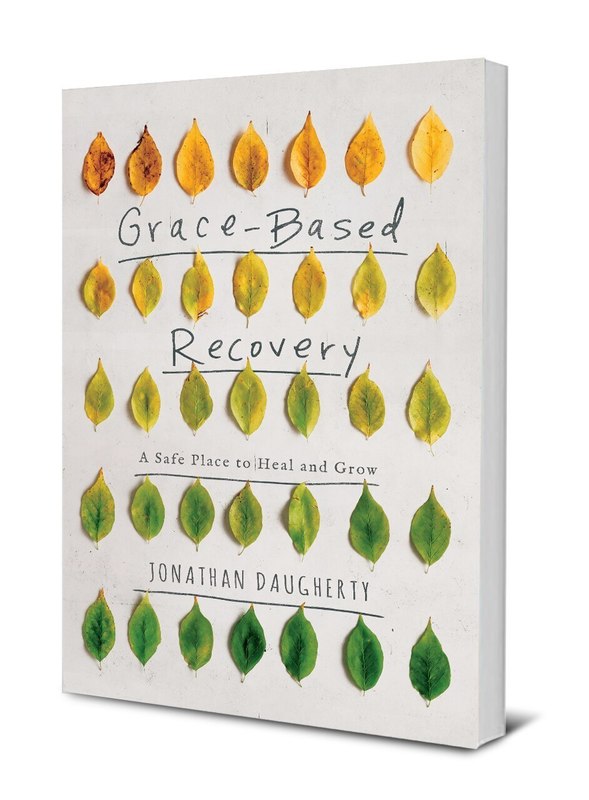Grace is essential for overcoming addictive strongholds—the compulsive behaviors and false beliefs that have ensnared you. The fact that God offers you grace shows you that you have value to God; it’s a value that isn’t based on your performance. Grace is God’s unearned favor or kindness toward you. You and I don’t deserve God’s love, but he offers it to us by grace. Therefore, recovery is more of a gift from God than it is a reward for your good performance.
Real recovery isn’t just about not doing something wrong or unhealthy; it’s about living daily in connection with God and others, and learning to live according to his Word. It isn’t based on your skill or willpower; it’s based on the grace of God. You must receive this gift of grace and let it work in your life if you are ever to break free from addictive strongholds.
For the grace of God has appeared, bringing salvation for all people, training us to renounce ungodliness and worldly passions, and to live self-controlled, upright, and godly lives in the present age, waiting for our blessed hope, the appearing of the glory of our great God and Savior Jesus Christ, who gave himself for us to redeem us from all lawlessness and to purify for himself a people for his own possession who are zealous for good works.
Titus 2:11-14 (ESV)
Grace Changes Everything!
Recovery from any addiction is hard. (What an understatement, right?) But sometimes it is made even harder by programs intended to help you break free from your compulsions. Some programs can make you feel as if an additional burden is being laid onto your already heavy heart. And even if a program is well-meaning, the message that can be communicated is, “If you don’t measure up to the standards of our program, you will be seen as an even greater failure.” This doesn’t make for a good start to an already daunting journey.
Grace offers a different approach to recovery, one that doesn’t place your value on the ever-changing roller coaster of performance. Grace gives hope to the person just realizing the need for recovery, and also breathes new life into the one who has been on the journey a while but feels stuck in a rigid rut of rules and performance-based rituals.
Grace-based recovery offers a pathway to true healing and lifelong freedom. Such recovery isn’t merely about managing behaviors or simply “not acting out.” It provides a way to experience fullness in every aspect of life and a pursuit of purpose that is meaningful and joyous.
Lessons Learned from Personal Experience
I have experienced many different kinds of recovery programs since 1999, when all my secrets and lies came to the surface. I have tried many methods, from “pain therapy” to intense Bible study and militaristic accountability. I have read many books, worked with numerous counselors, attended seminars, and studied multiple curriculums on addiction recovery.
Over all these years, I have found very few, if any, resources that are grace-based. Most are what I refer to as “sin management systems,” a way to feel better about yourself and your failures without ever truly breaking free. It is sad. But it is not unfixable!
Do you want to be free from your addiction? Of course, you do! Addiction sucks. Literally. It sucks the life from you. It tears apart relationships, destroys character, weakens the body, depresses the soul, and ultimately leads to death—in all areas of life. No one sets out to become addicted. But once you find yourself drowning in addiction, you must make a difficult choice: enter recovery or get worse.
Your Losses Can’t Compete with Your Gains
Entering recovery is not easy. It means having to admit things about yourself that are embarrassing and ugly. It means that someone else will have to hear your story of brokenness, selfishness, foolish decisions, and lack of self-control. You will have to decide if the pain of recovery is worth more than the continued, worsening pain of addiction.
You might lose your reputation if you choose recovery, because now the truth is out. You might lose your spouse. You might lose your children, your job, your possessions, even your life. Although you might lose such things if you choose recovery, it is more likely that you would lose those things anyway if you continue down the path of addiction. Any losses in recovery cannot compare with what is ultimately gained: freedom, peace, and joy.
But you might be wondering, How can grace cause all this change? I realize that the idea of grace doesn’t seem to fit with our normal understanding (or experience) with recovery. We think of recovery in terms of delivering brutal confessions, agonizing amend-making, setting up stringent boundaries, keeping high levels of accountability, and working our butts off. And while all those things are very much a part of the recovery process, apart from grace they simply become an idolatrous task list that exhausts the body and soul almost as much as addiction.
Grace-Based vs. Performance-Based
Grace changes everything because grace gives you a new lens through which to see the whole process of recovery. Grace reminds you over and over again that your value before God is unchanging regardless of your bad (or good) performance. Grace invites you to an ongoing process of growth in the context of love, joy, and authentic community.
Here are some possible differences between a grace-based perspective and a performance-based perspective and how they might affect recovery.

I know that this chart can be troubling for some, especially those who have had experiences in highly behaviorally focused programs. My intent is not to upset. I know that many have found help and significant breakthroughs in such settings. But there is no denying the differences between a recovery setting that is primarily focused on behavior modification (performance-based) and one that is focused on the freedom that God desires to give (grace-based)—even if those differences don’t play out exactly the way the chart describes.
Have you noticed something missing?
I have worked with hundreds of addicted individuals over the years and all who have come from performance-based environments have expressed the same sentiment: even after eliminating their addictive behaviors, something was still missing. They still felt “unfree” from something. In other words, simply “not acting out” was not real freedom, not true recovery.
This is where grace must enter the journey. Without the favor and kindness of God, there is no freedom, even if you never act out again. Spend some time asking God to show you his grace. Open yourself up to this wonderful gift. Read and reread Titus 2:11-14 and ask God to show you how he wants to manifest his grace in your life and recovery. Don’t rush this conversation. Sit in grace and let it soak to your bones. Be enveloped by the truth that in Jesus Christ, your value to God is unchangeable—he really does love you! When that truth sinks deep into your soul, you will know the grace of God—and it will change everything.
Celebrate God!
In grace-based recovery, all celebrations of victory give the credit to God rather than yourself. Why? Because recovery is a gift of God’s grace. Therefore, he deserves the glory, not you. This kind of celebrating can be difficult to do, when it feels very much like you were the one who resisted the temptation to act out! But remember, it is grace that trains us “to renounce ungodliness and worldly passions.” Even victories are a gift of God’s grace.
Excerpted from Grace-Based Recovery: A Safe Place to Heal and Grow © 2018 by Jonathan Daugherty. May not be reproduced without prior written permission.
GRACE-BASED RECOVERY: A SAFE PLACE TO HEAL AND GROW
A resource for addiction support and recovery groups, Grace-Based Recovery is a small-group study designed to help people suffering from addiction and those close to them understand God’s grace and why it is the only path to true freedom.






